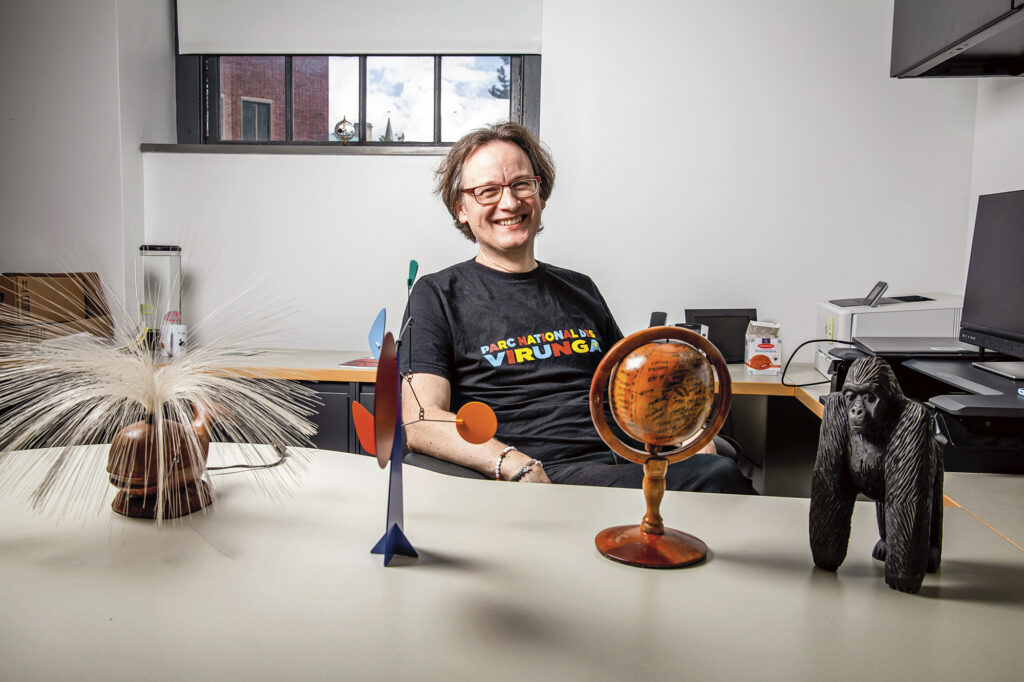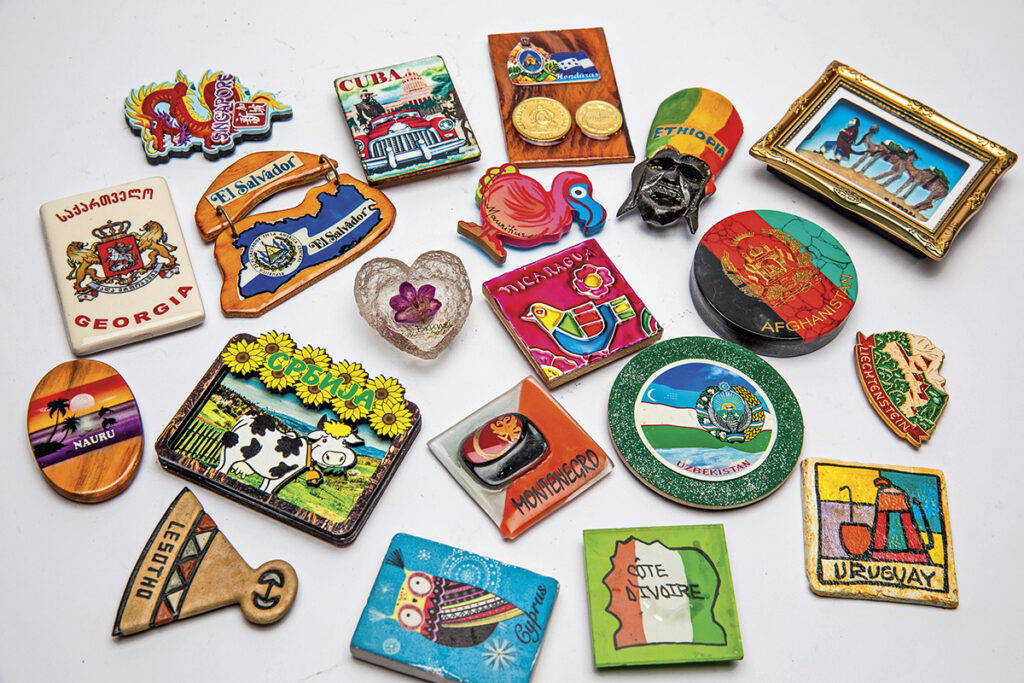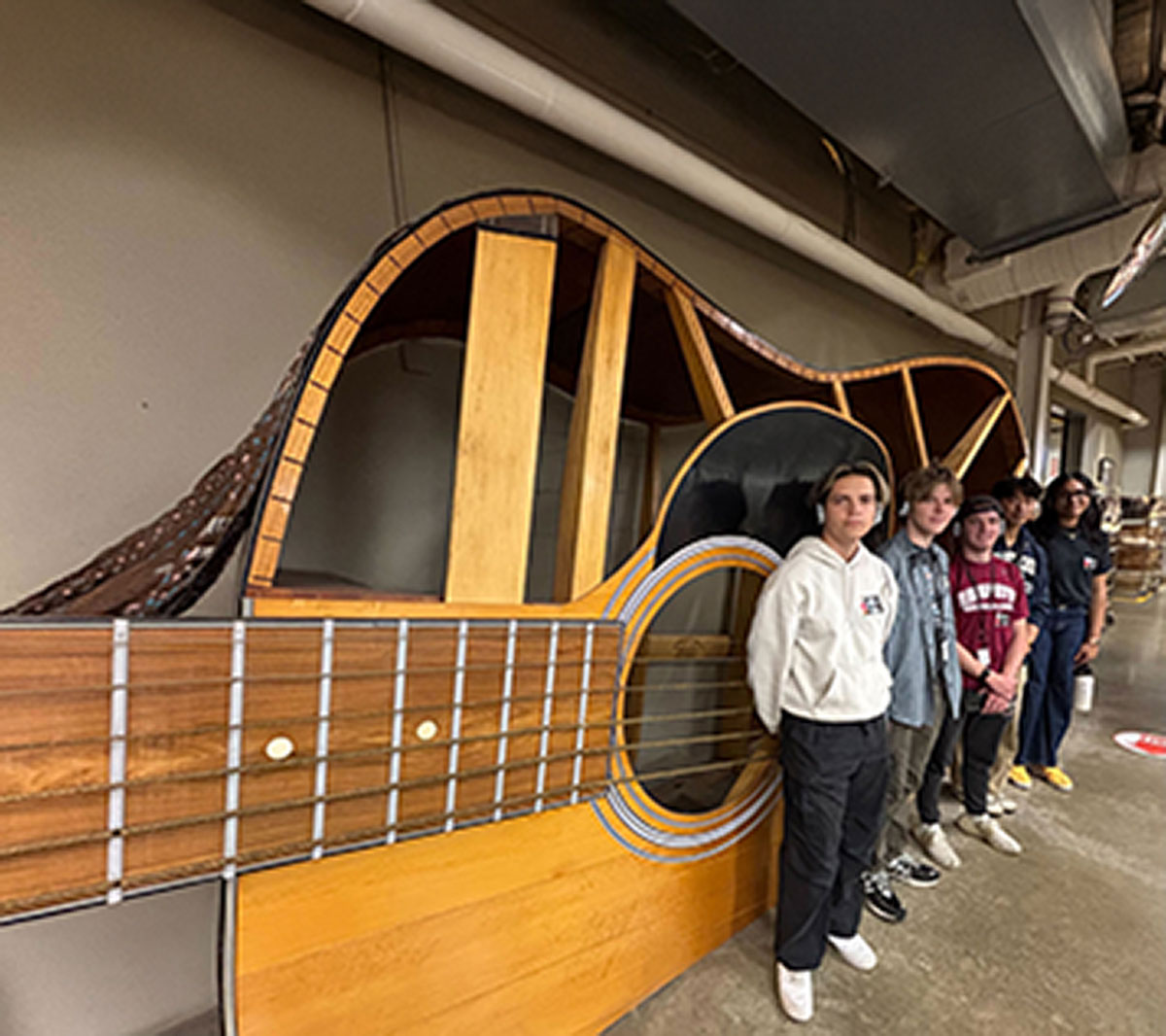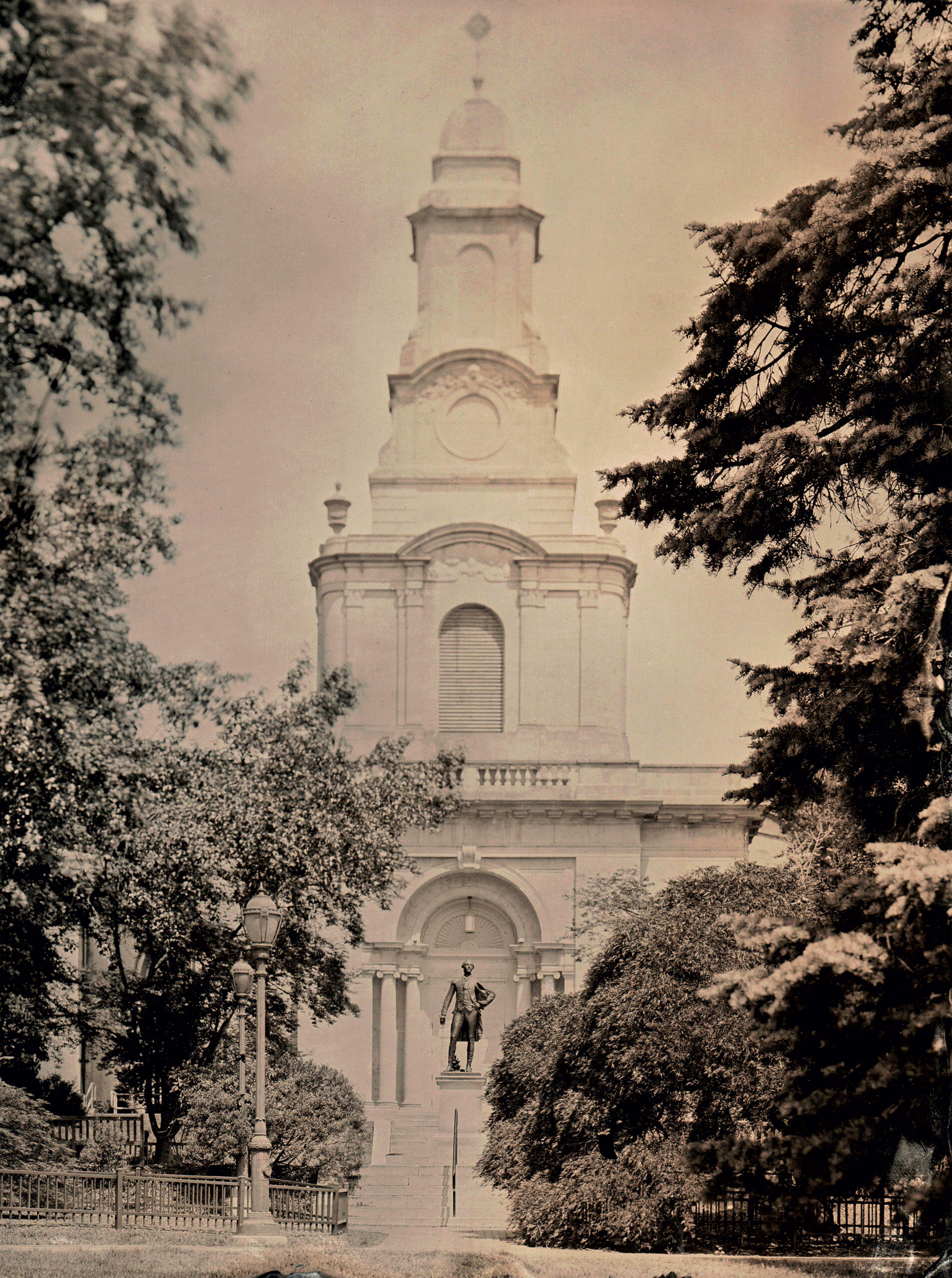Chasing 193
Physics Department’s Scott Shelley is one nation away from visiting all countries recognized by the United Nations.
by BRYAN HAY

Photography by thomas hengge
Growing up in the suburbs of Toronto, Scott Shelley and his family would spend summer vacations at Doe Lake in Katrine, a small town in the Muskoka region of central Ontario.
Year after year, they’d return to the same modest wood-framed cottage, single floor with white and red trim. Feeders in the backyard attracted hummingbirds, and hopeful chipmunks would wander by looking for handouts.
Shelley’s paternal grandparents had their own cottage at the end of the road, and many of his aunts, uncles, and cousins would come up on weekends. They played a lot of card games including Rummoli, euchre, and cribbage, and swam and fished in the lake.
“My dad was a high school teacher, and when the school year ended at the end of June, we would pack up the car the next day and immediately vacate for two months to go to the cottage, which was about three hours north of where I grew up,” remembers Shelley, a laboratory and demonstration coordinator in the Physics Department who has been at Lafayette since 2013.
“We would abandon all the things I knew, and we would just kind of go to this place that was, frankly, kind of boring after a while. There was not a lot to do,” he says. “And it was year after year from birth until the age of 16 or 17. It was the only thing I knew; the only vacations that we ever took were to this one destination.”
Shelley’s travel trajectory, driven by his early wanderlust and desire to explore the world, took a dramatic leap forward when he was a young adult, and it didn’t stop: He’s now only one nation away from visiting all of the 193 countries recognized by the United Nations.
Once he makes that trip—to North Korea, which has been under a U.S. travel ban since 2017—he’ll be among approximately 460 people who have ever accomplished the goal, according to NomadMania, which tracks the world’s most-traveled people.
About 30 years ago, the art and science of travel was cracked
open through support from Shelley’s stepfather, who worked for Air Canada.
“One of the defining moments for me was that he had access to travel passes for family members,” he says, remembering how one of those vouchers led to his first international trip in 1999—a spring break in London—during his first semester teaching after finishing grad school.
From there, the seductive lure of travel got him thinking about other places to visit. Scandinavia beckoned soon after London. Then came France and Switzerland, Asia, Central America, then Africa.
“Do I want to do this by myself? And I thought, that’s kind of scary,” he recalls. “I was not that young, probably 30, but I thought, why not? Let’s see what it’s like. And it was kind of amazing.”
Shelley became savvy about opening credit cards that offered sign-up bonuses, using dozens of credit cards over the years to earn miles and rewards that would fund flights. (After leveraging the perks, the majority of these credit cards would get canceled.) “Once flights are nearly free, the audacity of something like this starts to happen,” he laughs. He also learned to book flights 11 months in advance, when flights become first available, as this is typically when you can expect the best rate.
Before long, he started setting goals. After he’d been to 50 or 60 countries, he thought about marking a milestone of 100 countries by the time he turned 40.
“It was just a random round number that kind of made sense to me at the time,” says Shelley, who, after making it to his first 100 nations before 40, went all in with plans to plant his flag in the remaining 93.
Shelley traveled quite solidly between 2006 until 2019, visiting 10-12 countries per year. In 2016, he joined kindred travel spirits on “Every Passport Stamp,” a support network of globetrotters on Facebook seeking the common goal of visiting every nation on Earth. Over the course of three decades, travels were only paused during the pandemic.
The routine schedules and predictable academic semesters at Lafayette, including interim session, have allowed for his robust travel over the summer and during breaks.
“So, I kept chipping away, going to places that were slightly more dubious, perhaps slightly more on the watch list,” Shelley says, adding that every trip has had its joys and surprises.
Shelley has shelves of his favorite and most nostalgic keepsakes from his travels in his Hugel Science Center office.
Because trip planning is half the fun, he does his own bookings and travel itineraries. A growing number of countries have visa applications on arrival, but Shelley prefers to secure all necessary paperwork before he leaves the U.S. to simplify his entry through customs. (Easton’s close proximity to New York, and the embassies there, have helped with visa preparation on at least one occasion.)
As a dual citizen, he uses both of his passports, although at 36 pages, his Canadian passport fills up faster than his 48-page U.S. passport.
Acquired by growing up in bilingual Canada, his competency in French, still the official or co-official language in many countries, is always useful, including on his spring break trip this year to Morocco.
He enjoys traveling solo but sometimes invites friends, family, and colleagues along on his adventures. Shelley asked Zoe Boekelheide, associate professor of physics and department head, and her husband to accompany him to Chile in 2019 for the total solar eclipse in La Serena, which was one of the best places on Earth to view the celestial phenomenon that year.
“Scott is a wonderful guide and companion, and was a great resource for travel information in Chile,” Boekelheide says. “Instinctively, he suggested some other sites for my husband and me to see in Chile. We really enjoyed Valparaíso and Pablo Neruda’s house on his recommendation. We were fortunate to have Scott with us and benefit from his travel experiences.”
Sometimes having companions adds a level of comfort and security when visiting more challenging, remote counties. There are also times that require hiring an experienced, trusted guide depending on the country’s regulations and protocols for international visitors. Most of his trips have been enjoyable, but Shelley easily recounts those that made him feel uneasy.
Afghanistan in 2019, which included stops in Kabul and Herat, was one of those times. “We hired a guide for the entirety of the trip,” Shelley says, noting that it was invaluable to have someone on the ground with local connections in order to move about safely and responsibly. “You have to be prepared for anything.”
On another trip, Shelley was heading to the airport to return home from Bangui, the capital city of the Central African Republic, when the taxi he was in encountered protests in the streets. The taxi driver’s reaction was not exactly comforting, either.
“He just said, ‘We can’t get there. We’re not going to be able to reach the airport,’” Shelley recalls the nervous words from the driver.
Shelley then pulled up Google Maps and ultimately directed his driver around the roadblocks, calling it “the finale to a pretty intense couple days in the Central African Republic.”
During a trip to Guinea, Shelley was staying in a nice hotel in the capital city of Conakry, about three miles from the airport. He knew that Conakry would also be a difficult travel destination because of its reputation. “I prepared for it mentally,” he says, explaining that he decided to only be there for one day in 2017. However, when it was time to go home, he had another harrowing drive to the airport—this one three hours by taxi because of poor road conditions and high traffic volume—and when he arrived at the terminal, he saw that his outbound flight didn’t exist.
“Suddenly I’m having to fend for myself and figure out how to get out of there,” Shelley adds. “I ended up having to stay another day, but sometimes you have to take a deep breath and accept your situation.”
Then there are the countries that might carry a complicated reputation, or come with various travel advisories—but that ultimately leave a lasting impression in beautiful ways. After Shelley traveled to Iran in 2016, for example, he was so taken by the elegant Persian architecture and blue mosques, and the authentic kindness of the Iranian people, that it’s at the top of his list of places he’d want to eventually return.

Another destination he’d love to see for a second time is Namibia. His original trip occurred in 2008, when he was making his way along southern Africa’s western coast, which he describes as his first, and best, safari experience.
“I was driving north, driving through nothingness, as I approached my destination of Etosha National Park at dusk when I saw a single zebra, far off in the distance,” Shelley recalls. “I stopped the car, balanced my camera on the top of the car, and took dozens of grainy photos of the first zebra I ever saw in the wild.”
The following morning, he woke up in the vast plains of the park only to realize that he could see thousands of zebras at once.
“The camp in which I stayed, Okaukuejo, is famous for its floodlit waterhole right outside of the property fence,” he explains. “I was so excited to be there that I would wake up every few hours, walk outside, and see what was drinking. One time, it was hundreds of elephants, while another it was a single giraffe inelegantly crouching to drink. An absolutely fantastic place.”
Asked if he ever develops a yearning for a routine, uncomplicated trip—say, to the seashore or some other quick escape—he laughs and freely admits that his sights are always trained toward international travel.
“I have a collector’s mentality,” he says, noting he gets his fill of domestic travel by attending physics conferences.
A two-week family vacation with his wife, Tiffany, and their children, William and Paul, is planned in South Africa for this summer, with a side trip to Victoria Falls, Zambia, and Zimbabwe, all favorite repeaters for Shelley. A trip to his home country, Canada, is also on the books.
Earlier in the summer, in June, Shelley traveled to Beijing and mainland China, with the hopes of maybe finding a way into North Korea with his dual U.S.-Canadian citizenship. It’s still elusive.
“I recognized a larger universe to explore,” Shelley says, about experiencing wanderlust as a young adult, something that only grew stronger with time.
As he ponders North Korea to complete his personal passport, he knows he could declare victory on a technicality: He stepped foot into it during a 2014 visit to the infamous demilitarized zone from South Korea, but he resists counting it as an official stop because of his personal credo to be in a country for at least three or four days to fully experience it before taking credit for the visit.
“I’ll get there eventually,” he says.
Until then, Shelley finds that his travel experiences help him relate to students as he teaches physics labs on campus. Accumulated and diverse world views from absorbing different cultures and traditions help bring perspectives to physics, which, paradoxically, is a form of travel.
“In this job in particular, it really has helped me connect with people,” he says. “Lafayette has a fair number of international students, and it’s just nice to have a conversation with them that opens up naturally when you can say, ‘Oh, I know that place.’”
Even with his rich record of travel adventures, Shelley often reflects back to the cottage in the Muskoka region of Ontario. He calls it his origin story.
“I would have never imagined that spot would have been the inspiration for this quest. But that’s really where it started, where I recognized a larger universe to explore.”










